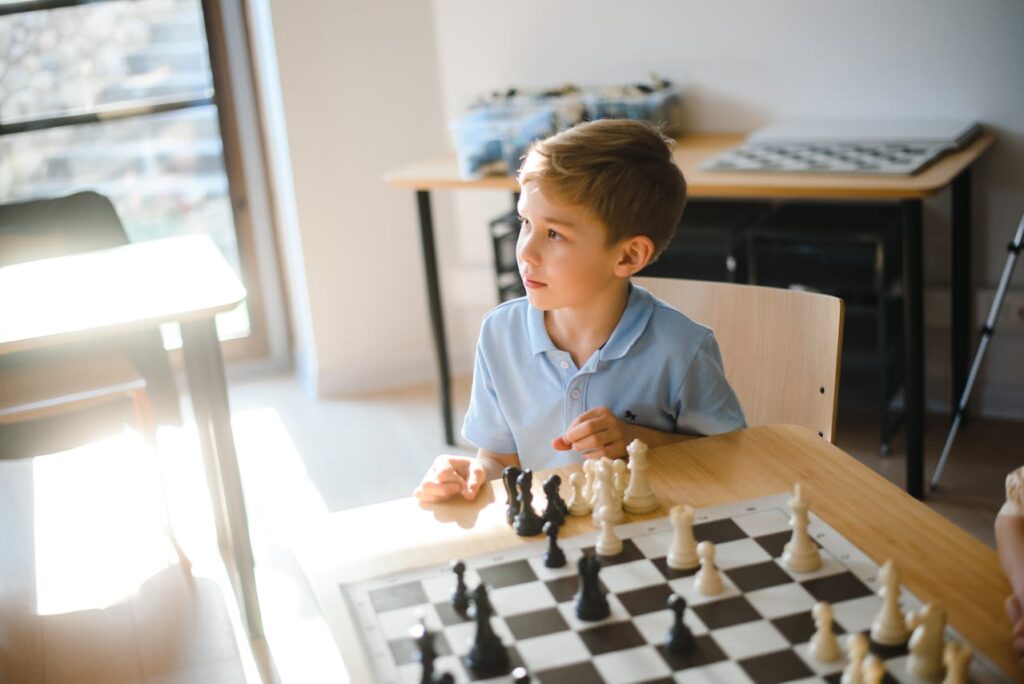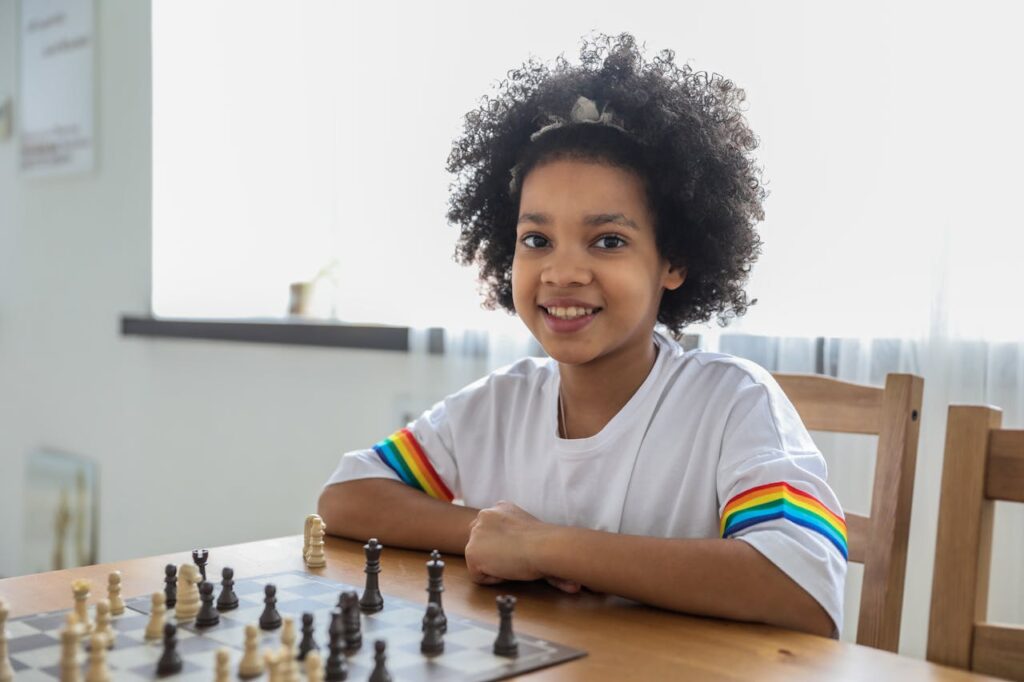In today’s world, children are exposed to countless activities that promise to engage their minds and help them grow. Yet, not all of these activities foster the kind of deep, thoughtful competition that truly builds character and skills. Chess is different. It’s a game that challenges the intellect, sharpens the mind, and teaches invaluable life lessons.
But more than that, chess introduces kids to the concept of healthy competition—a kind of competition that encourages growth, resilience, and self-improvement without the negative effects that sometimes come with more intense competitive environments.
The Role of Competition in Child Development
Competition is often viewed with mixed feelings by parents and educators. While some see it as a necessary part of life, helping children learn to strive for excellence, others worry that it can create undue pressure or foster negative behaviors like jealousy or aggression.
What Is Healthy Competition?
Healthy competition is the kind that encourages children to push their limits in a supportive and positive environment.
It’s about setting goals, working hard to achieve them, and celebrating both the effort and the outcome, whether they win or lose.
Healthy competition teaches children that success comes from dedication and perseverance, not just from being the best.

It also helps them understand that failure is not something to fear, but rather an opportunity to learn and grow.
In a healthy competitive environment, children are motivated to improve their skills and knowledge, but they also learn to appreciate the achievements of others.
How Chess Promotes Healthy Competition
Chess is the epitome of healthy competition. It’s a game that requires thought, strategy, and patience—qualities that are developed over time and with practice.
In chess, success is not about brute strength or luck, but about careful planning and the ability to anticipate and adapt to an opponent’s moves.
This makes it a unique platform for children to experience competition in a way that builds them up rather than tearing them down.
One of the key ways chess promotes healthy competition is by emphasizing personal improvement over simply winning.
Because the game is so deeply strategic, children quickly learn that the real challenge is not just defeating their opponent, but also mastering their own thinking process.
Every game is an opportunity to learn something new—whether it’s a better strategy, a more effective defense, or a deeper understanding of the game itself.
Additionally, chess teaches children to respect their opponents. Unlike many other competitive activities, where emotions can run high, chess is a game of calm and concentration.
Life Skills Developed Through Chess
Chess is more than just a game; it’s a powerful educational tool that helps children develop a wide range of life skills.
These skills are not only crucial for success in school but also for navigating the complexities of life as they grow up.
Critical Thinking and Problem-Solving
One of the most valuable skills that chess teaches is critical thinking. To succeed in chess, players must think several moves ahead, consider various possibilities, and anticipate their opponent’s strategies.
This kind of forward-thinking requires children to analyze situations carefully, weigh different options, and make decisions based on logic and reason.
These critical thinking skills are directly transferable to other areas of life. In school, they help children tackle complex math problems, write well-organized essays, and engage in thoughtful discussions.
Beyond academics, critical thinking is essential for making informed decisions, solving everyday problems, and approaching challenges with a clear and analytical mind.
Patience and Strategic Planning
Chess is a game of patience. Unlike fast-paced sports or video games, where actions are often impulsive and immediate, chess requires players to slow down, think carefully, and plan their moves with precision.
This need for deliberate, strategic planning helps children develop patience, teaching them that sometimes the best results come from waiting and thinking things through rather than rushing into action.

Strategic planning in chess involves setting long-term goals and working steadily toward them.
Children learn to plan not just their next move, but several moves ahead, taking into account the potential responses of their opponent.
This skill of thinking strategically is incredibly valuable, both in academic settings and in life.
Whether they’re planning a school project, setting personal goals, or navigating a complex situation, the ability to think ahead and plan carefully is a skill that will serve them well.
Resilience and Handling Failure
No one wins every game of chess. In fact, losing is an integral part of the learning process in chess. Each loss provides valuable lessons, showing players where they went wrong and how they can improve next time.
This experience of losing and learning is crucial for developing resilience—the ability to bounce back from setbacks and keep trying, even when things don’t go as planned.
Chess teaches children that failure is not something to be feared, but rather an opportunity for growth.
By regularly facing challenges and occasionally losing games, children build the resilience needed to handle failure constructively.
They learn that setbacks are a natural part of life and that persistence is key to overcoming obstacles.
Social Skills and Sportsmanship
Chess is often seen as a solitary game, but it’s also a deeply social activity.
Whether playing with friends, participating in a chess club, or competing in tournaments, children who play chess regularly engage with others, learning important social skills along the way.
One of the key social skills that chess teaches is sportsmanship. In chess, players are expected to respect their opponents, play by the rules, and accept the outcome of the game gracefully.
This emphasis on fair play and respect helps children develop a strong sense of integrity and teaches them the importance of treating others with kindness and consideration, regardless of the outcome.
How Chess Fosters a Growth Mindset
One of the most important benefits of chess is that it fosters a growth mindset—a belief that abilities and intelligence can be developed through effort, learning, and persistence.
This mindset is crucial for success in all areas of life, as it encourages children to embrace challenges, learn from mistakes, and keep striving for improvement.
Learning from Mistakes
Chess is a game that naturally involves making mistakes. Even the best players occasionally overlook a crucial move or miscalculate a strategy.
What sets successful players apart is their ability to learn from these mistakes and use them as stepping stones to improvement.
When children play chess, they quickly learn that mistakes are not the end of the world. Instead, they are opportunities to learn and grow.
Each game offers valuable insights into what works and what doesn’t, and by reflecting on their mistakes, children develop a deeper understanding of the game and their own thinking process.
This approach to mistakes is a key component of the growth mindset. Children who learn to view mistakes as learning opportunities are more likely to take risks, try new things, and persist in the face of challenges.
Embracing Challenges
Chess is a challenging game, but it’s precisely this challenge that makes it so rewarding.
Whether it’s figuring out a complex position, finding the best move under pressure, or competing against a stronger opponent, chess constantly presents children with opportunities to push their limits and grow.
By regularly engaging with these challenges, children learn to embrace difficulty rather than shy away from it.
They develop a love of learning and a desire to improve, both of which are key aspects of the growth mindset.
This willingness to face challenges head-on is crucial for success in all areas of life, as it encourages children to step outside their comfort zone and strive for excellence.

The Role of Chess in Building Confidence
Confidence is an essential trait that helps children tackle new challenges, express their ideas, and pursue their goals.
Chess plays a significant role in building this confidence by providing a structured environment where children can experience success through their own efforts.
Achieving Success Through Effort
One of the most empowering aspects of chess is that it rewards effort. In chess, the more time and energy a child invests in learning and practicing, the better they become.
This clear connection between effort and improvement helps children realize that they have control over their success.
For a child, winning a chess game after carefully planning and executing their strategy is incredibly validating.
It’s proof that their hard work pays off, and this realization boosts their confidence not just in chess, but in other areas of life as well.
They begin to understand that with dedication and persistence, they can overcome challenges and achieve their goals, whether in academics, sports, or personal endeavors.
Overcoming Setbacks Builds Resilience
Confidence is not just about celebrating victories; it’s also about how a child handles setbacks.
Chess, with its inherent ups and downs, teaches children that setbacks are a natural part of any learning process. Losing a game isn’t a failure—it’s an opportunity to reflect, learn, and improve.
When children lose a chess game, they’re encouraged to analyze what went wrong.
This reflective practice helps them understand that setbacks are temporary and that they have the power to learn from their mistakes and do better next time.
Over time, this builds a deep-seated resilience, making them more confident in facing challenges both on and off the chessboard.
Chess and Academic Performance: A Winning Combination
Chess is not just a game that builds character and confidence—it also has a direct impact on academic performance.
The skills developed through playing chess, such as critical thinking, problem-solving, and focus, are directly applicable to academic success.
Enhancing Cognitive Skills
One of the most significant academic benefits of chess is its ability to enhance cognitive skills.
Chess requires players to think several moves ahead, consider multiple possibilities, and anticipate their opponent’s actions.
This type of deep thinking exercises the brain and helps develop higher-order thinking skills, which are crucial for academic success.

For instance, the strategic thinking required in chess helps improve a child’s ability to plan and organize their thoughts—skills that are directly transferable to writing essays, solving math problems, and studying for exams.
The process of analyzing different outcomes and making decisions based on logical reasoning also mirrors the critical thinking needed to excel in subjects like science and mathematics.
Improving Focus and Concentration
In today’s world, where distractions are abundant, the ability to focus and concentrate is more important than ever.
Chess is a powerful tool for developing these skills, as it requires sustained attention and careful consideration of each move.
During a chess game, children must stay focused for extended periods, concentrating on both their own strategy and their opponent’s potential moves.
This intense focus helps train the brain to block out distractions and maintain attention on the task at hand—a skill that is invaluable in the classroom.
Children who regularly play chess often find that their improved focus translates to better performance in school.
Encouraging a Love of Learning
Chess fosters a growth mindset and a love of learning, both of which are crucial for long-term academic success.
The game challenges children to constantly improve and pushes them to explore new strategies, learn from their mistakes, and seek out new knowledge.
This passion for learning that chess instills can spill over into other areas of a child’s life. Children who enjoy the process of mastering chess are more likely to approach their studies with the same enthusiasm.
They become curious learners who are eager to tackle new subjects and delve deeper into areas of interest, which can lead to academic excellence.
Chess as a Pathway to Lifelong Skills
The benefits of chess extend far beyond childhood. The skills and lessons learned through chess lay the foundation for lifelong success in various areas, from professional careers to personal relationships.
By introducing your child to chess, you’re giving them tools that will serve them well into adulthood.
Building Decision-Making Skills
Chess is a game of decisions. Every move requires careful thought, weighing the pros and cons, and considering the potential outcomes.
This constant decision-making process helps children develop the ability to make informed, thoughtful decisions—an essential skill for life.
In the professional world, the ability to make good decisions is highly valued.
Whether it’s deciding how to approach a project, manage a team, or navigate a difficult situation, the decision-making skills honed through chess are directly applicable to the challenges faced in the workplace.
Enhancing Emotional Intelligence
Emotional intelligence (EQ) is just as important as cognitive intelligence (IQ) when it comes to success in life.
EQ involves the ability to understand and manage one’s own emotions, as well as the ability to empathize with and relate to others. Chess plays a significant role in developing these emotional skills.
Through chess, children learn to manage their emotions, whether it’s dealing with the frustration of a tough loss or the excitement of a well-earned victory.
They also learn to recognize and respect the emotions of their opponents, developing empathy and social awareness.
Fostering Independence and Responsibility
Playing chess teaches children to take responsibility for their actions. Every move they make on the chessboard is their own decision, and the outcome of the game is a direct result of their choices.
This sense of ownership fosters independence and responsibility, as children learn that they are in control of their success.

These traits are essential for becoming a self-reliant and responsible adult.
Whether it’s taking responsibility for their work, managing their time effectively, or making informed decisions, the independence and responsibility developed through chess prepare children for the challenges of adulthood.
Why Every Child Should Learn Chess
Given the numerous benefits that chess offers, it’s clear that every child can gain something valuable from learning the game.
Whether it’s building critical thinking skills, fostering a growth mindset, or simply enjoying the satisfaction of mastering a challenging game, chess has something to offer every child.
Chess Is Accessible to All
One of the great things about chess is that it’s accessible to everyone, regardless of age, background, or physical ability.
All that’s needed is a chessboard, a willingness to learn, and the desire to improve. Chess doesn’t require special equipment, physical strength, or even a particular environment.
It’s a game that can be played anywhere, at any time, making it easy to incorporate into any child’s routine.
Moreover, chess is a game that can be learned at any age.
Whether your child is a young beginner just starting out or a teenager looking to develop their strategic thinking, chess offers a level of challenge that is appropriate for their stage of development.
Chess Promotes Inclusivity and Diversity
Chess is a universal game that transcends cultural, social, and economic barriers. It’s played and enjoyed by people from all walks of life, and it fosters a sense of inclusivity and diversity.
In the world of chess, what matters is your skill, strategy, and ability to think critically—not your background or status.
By introducing your child to chess, you’re exposing them to a global community of players who share a common passion for the game.
This exposure helps children develop a broader perspective, appreciate different cultures, and embrace diversity. It also teaches them that success is determined by effort and ability, not by external factors.
Chess Offers a Lifelong Journey of Learning
Chess is a game that can be enjoyed for a lifetime.
It’s a journey of continuous learning, where there’s always something new to discover, whether it’s a new opening strategy, a historical game, or a deeper understanding of the principles that govern the game.
This ongoing challenge keeps the game fresh and exciting, encouraging a lifelong love of learning.
For children, this means that chess is not just a phase or a passing interest, but a skill and passion that can grow with them throughout their lives.
It’s an activity that they can enjoy in different ways at different stages of their life, from playing casually with friends to competing in tournaments, to studying the game’s rich history and strategies.
Conclusion
Chess is much more than just a game. It’s a powerful tool for developing critical life skills, fostering healthy competition, and building confidence.
Through chess, children learn to think critically, plan strategically, handle setbacks with resilience, and interact with others respectfully.
These are the skills that will serve them well throughout their lives, both in their academic pursuits and in their personal and professional journeys.
READ NEXT:

